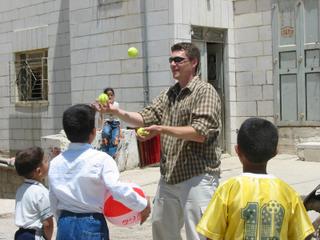
On Playing on the Street with Children
What do you picture when you think of nonviolent resistance? Standing in front of tanks? Murals? Marchs? Palestinian resistance to the Israeli military occupation has taken all of these forms and many more. Today, Palestinians paint murals on the Annexation Wall, confront soldiers, and hold marches. Internationals, like me, have accompanied them during these demonstrations. We have stood in front of tanks. We have stayed in Palestinian house stalled to be demolished. We have broken curfews.
But we have also played with children. Yes, as unimaginable as it seems, in Palestine, playing outside is a form of nonviolent resistance. In the city of Hebron, there are many neighbourhoods where it is unsafe for children to leave their homes and play outside on their streets. In Hebron, groups of especially militant, fundamentalist Jews have taken over Palestinian homes and established illegal settlements. These settlers are actively trying to drive out the Palestinians living in Hebron: they throw rocks at Palestinian homes, strip naked and walk through Palestinian neighbourhoods, and also assault and shot Palestinians. Palestinian children are not exempt from their attacks.
Myself and other members of a Christian Peacemaker Team delegation spent half a day in a Palestinian neighbourhood next to one of these settlements. School just ended in Palestine, and children in the Tel Ramadia neighbourhood haven’t been able to play outside because of the settlers. At the invitation of Palestinian families, we brought balls and ice cream out to the children. Within five minutes, there must have been 30 children outside, playing soccer, catch, and even volleyball with us. Never had anyone from CPT seen so many children out on the streets.
While we were playing, a white van filled with settlers tore out of the settlement and speed towards me. I ran out of the way, shaking. It was clear that the settlers wanted to scare us. Sadly, the sight of Palestinian children playing outside of their houses threatens these people.
Not many activists get to play with kids as a part of their work, but I do. Sadly, though that is because activities that should be taken for granted by children and adults every where are often impossible under the occupation. For Palestinians, including children, continuing every day life is nonviolent resistance.



No comments:
Post a Comment